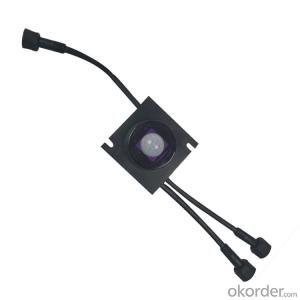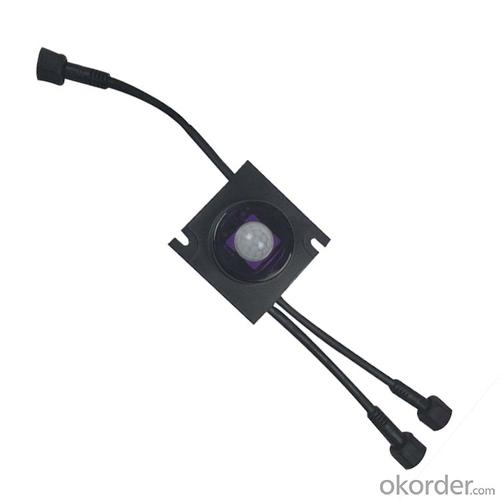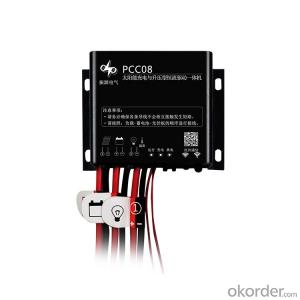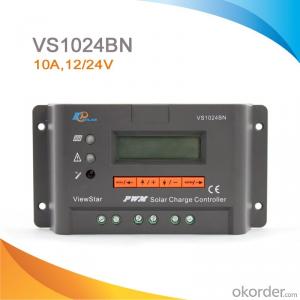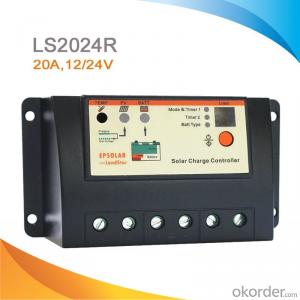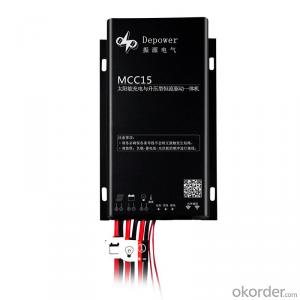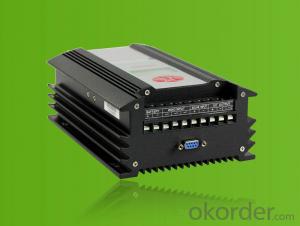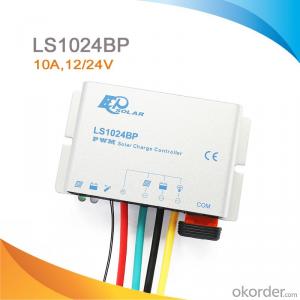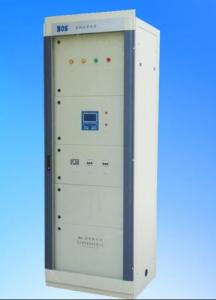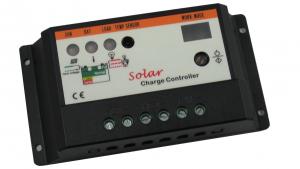PCC08AI 12V 8A PWM All in One Solar Charge Controller for 40W Solar Street Light with Human Sensor
- Loading Port:
- China main port
- Payment Terms:
- TT OR LC
- Min Order Qty:
- 1 pc
- Supply Capability:
- 1000 pc/month
OKorder Service Pledge
OKorder Financial Service
You Might Also Like
1. Features of the 8A 12V street light controller
-support Lithium battery only
-With IR/Microwave sensor
-IP68 waterproof line and remote control
-Five times and dimming control
2. Technical parameters
Item | Content | PCC08A G4 | unit |
Battery parameters | Battery Type | lithium battery | - |
Battery Voltage | 12V | - | |
Max. charge current | 8 | A | |
Boost charge | 12.5 | V | |
Low voltage disconnect | 9 | V | |
Low voltage reconnect | 10.5 | V | |
Panel parameters | Panel Voltage | ≤25 | V |
Max Panel Power | 120 | W | |
PV Voltage@ Lighting off | ≤5 | V | |
Output Current Range | 50~2000 | mA | |
LED Parameters | Output Voltage Range | 16~50 | - |
Max. Output Power | 40 | V | |
Output current error | ≤3%FS | W | |
Output mode | 1. Time control mode | ||
2. Sensing mode | - | ||
3. Delay sensing mode | |||
Dimmable phase time | 5 | - | |
LED dimming range | 0~100 | % | |
System Parameters | Max LED constant current drive efficiency |
| |
Consumption current | ≤10(infrared ), | mA | |
≤14(microwave) | mA | ||
Remote shutdown power consumption | ≤1 | mA | |
Communication Mode | Infrared wireless | Y | |
History Data | 1 | - | |
Save/Work Temperature | -30~60 | ℃ | |
Save / Work Humidity | 0~100% | RH | |
Altitude | 3000 | m | |
Ingress protection | IP67(1.5m,72h) | - | |
Certification | CE,ROSH | - | |
Mechanical Parameters | Weight | 0.17±0.01 | KG |
Mechanical Dimensions | 71*71*27.8 | mm |
3.Image
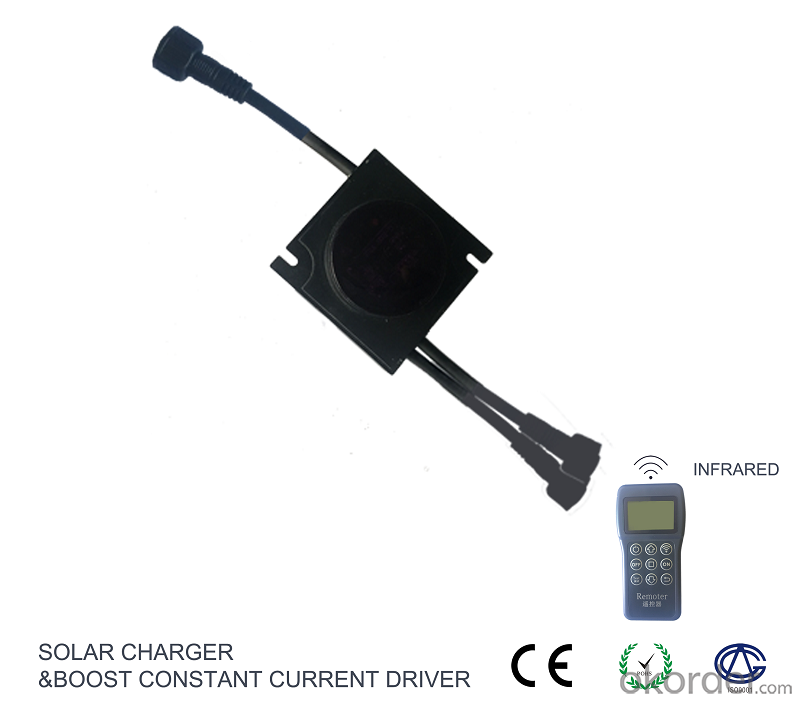
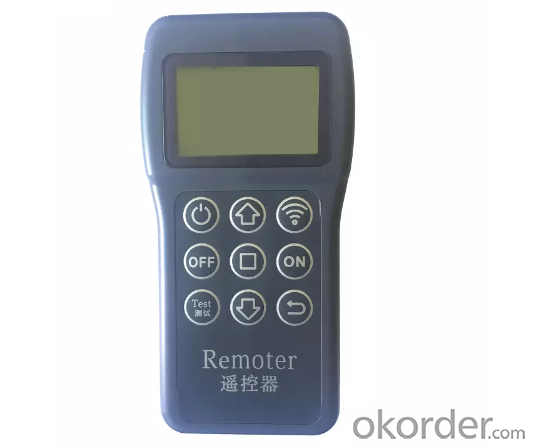
4.FAQ
Q:DO YOU HAVE ANY CERTIFICATION FOR YOUR PRODUCTS?
A:We have ISO9001:2015,CE、RoHS certifications for all of our products.
Q:DO YOU HAVE MOQ FOR PLACE ORDER?
A:Low MOQ,1pe for sample checking is available
- Q: Does a solar controller require any maintenance?
- Yes, a solar controller does require some maintenance. Regular maintenance tasks include checking for any loose connections, cleaning the controller and solar panels to remove any dirt or debris, and inspecting for any signs of wear or damage. It is also important to regularly monitor the system's performance and ensure that it is functioning properly.
- Q: How does an MPPT solar controller differ from a PWM controller?
- An MPPT (Maximum Power Point Tracking) solar controller and a PWM (Pulse Width Modulation) controller are two different types of charge controllers used in solar power systems. The main difference between these two controllers lies in their charging techniques and efficiency. A PWM controller is simpler and more basic compared to an MPPT controller. It works by rapidly turning the solar panel's output on and off, allowing the battery to be charged intermittently. This results in a fluctuating charging current, where the panel output voltage is reduced to match the battery voltage. As a result, the solar panel operates at a lower voltage than its maximum power point, leading to some power loss. On the other hand, an MPPT controller is more advanced and efficient in maximizing the power output of the solar panel. It uses a sophisticated algorithm to continuously track the maximum power point of the panel, adjusting the voltage and current to ensure that the panel operates at its optimum output. By doing so, an MPPT controller allows the solar panel to deliver its maximum power to the battery, resulting in higher charging efficiency and overall system performance. Moreover, an MPPT controller can handle higher input voltage from the solar panel, which enables the use of longer wiring distances and allows for more flexibility in system design. It also works well in conditions where the solar panel's output voltage is significantly higher than the battery voltage. In summary, while a PWM controller is a simpler and more cost-effective option, an MPPT controller offers superior charging efficiency, better utilization of the solar panel's power, and the ability to handle higher voltage inputs. Therefore, an MPPT controller is generally recommended for larger, more complex solar power systems, where optimizing energy harvest and maximizing system performance are of utmost importance.
- Q: Can a solar controller be used in a solar-powered heating system?
- Yes, a solar controller can be used in a solar-powered heating system. A solar controller is responsible for regulating the flow of electricity from the solar panels to the heating system, ensuring efficient operation and preventing overcharging of the batteries. It helps optimize the performance of the heating system by monitoring and adjusting the energy input based on the heating requirements.
- Q: Can a solar controller be used with a solar-powered weather station?
- Yes, a solar controller can be used with a solar-powered weather station. The solar controller regulates the charging and discharging of the batteries in the weather station, ensuring efficient use of the solar power generated by the station's solar panels. This helps maintain the batteries' lifespan and ensures that the weather station operates reliably even during periods of low solar energy.
- Q: How do I prevent reverse current flow with a solar controller?
- To prevent reverse current flow with a solar controller, you can use a diode or a blocking diode in the circuit. This diode will allow current flow from the solar panel to the battery but block any reverse current flow from the battery back to the solar panel, effectively preventing any damage to the system.
- Q: How does a solar controller prevent damage from reverse polarity connections?
- A solar controller prevents damage from reverse polarity connections by utilizing built-in protection mechanisms that detect and block the flow of current when the positive and negative terminals are incorrectly connected. This prevents any potential damage to the solar panels, batteries, or other connected devices, ensuring the system remains safe and functional.
- Q: Can a solar controller be used with different types of solar panel grounding systems?
- Yes, a solar controller can be used with different types of solar panel grounding systems. The solar controller is responsible for regulating the flow of electricity between the solar panels and the battery or grid. It typically has built-in protection mechanisms to ensure the safety and efficiency of the solar panel system. The grounding system for solar panels is crucial for the safety of the installation. It provides a path for electrical currents to dissipate safely in case of a fault or lightning strike. There are different types of grounding systems, such as grounding through the mounting structure, grounding through a dedicated grounding conductor, or grounding through the building's electrical system. Regardless of the type of grounding system used, the solar controller's main function is to manage the charging and discharging of the batteries or the flow of electricity to the grid. It does not directly interact with the grounding system. Therefore, a solar controller can be used with different types of solar panel grounding systems without any issues. However, it is important to ensure that the grounding system is properly designed and installed according to local electrical codes and regulations. This will ensure the safety and reliability of the entire solar panel system. It is recommended to consult with a certified electrician or solar installer to ensure proper grounding practices are followed.
- Q: Can a solar controller be used with flexible solar panels?
- Yes, a solar controller can be used with flexible solar panels. Solar controllers are designed to regulate the charging process of solar panels, regardless of their flexibility. As long as the flexible solar panel is compatible with the solar controller's voltage and current ratings, it can be used effectively.
- Q: What is the maximum voltage drop allowed between the solar panels and the solar controller?
- The maximum voltage drop allowed between the solar panels and the solar controller depends on the specific system and its components. Generally, it is recommended to keep the voltage drop below 2% for efficient operation. However, this value may vary depending on factors such as the distance between the panels and the controller, the size of the system, and the type of wiring used. It is important to consult the manufacturer's specifications and guidelines for the solar panels and controller being used to determine the maximum acceptable voltage drop.
- Q: Solar water heater all intelligent controller how to install
- Different manufacturers are not the same, you can call to contact after-sales processing
Send your message to us
PCC08AI 12V 8A PWM All in One Solar Charge Controller for 40W Solar Street Light with Human Sensor
- Loading Port:
- China main port
- Payment Terms:
- TT OR LC
- Min Order Qty:
- 1 pc
- Supply Capability:
- 1000 pc/month
OKorder Service Pledge
OKorder Financial Service
Similar products
Hot products
Hot Searches
Related keywords
